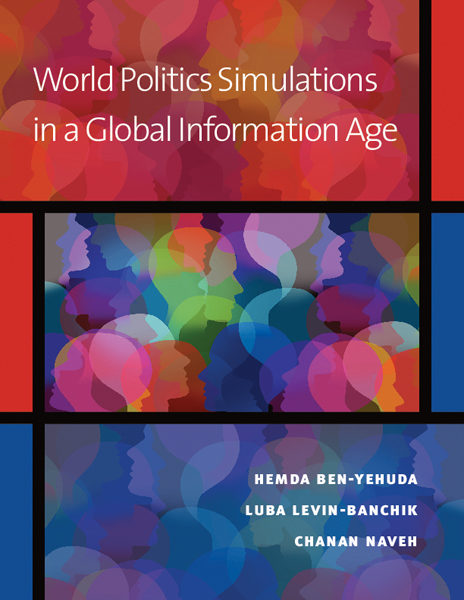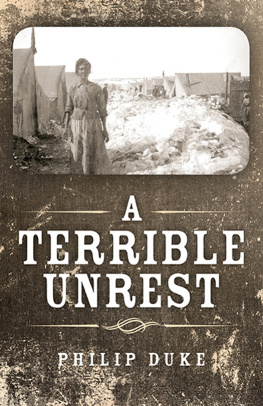
World Politics Simulations in a Global Information Age
This comprehensive guide explains how to create simulations of international relations for the purposes of both teaching and research. The use of web-based social networks allows for simulations not only among students on the same campus but also among participants literally around the globe.
Hemda Ben-Yehuda, Luba Levin-Banchik, and Chanan Naveh offer as a model their hallmark World Politics Simulation Project, which involves participants in teams representing various states, nonstate actors, and media organizations embroiled in an international political crisis. Following the trajectory of a simulation, they describe theory, implementation, and analysis. Starting with a typology of simulations, they present a framework for selecting the most suitable kind of simulation in a given teaching situation, based on academic setting, goals, costs, and other practical considerations. The authors then provide step-by-step instructions for creating simulations on cyber platforms, particularly Facebook, complete with schedules, guidelines, sample forms, teaching tips, and student exercises. Throughout the simulation, and during the postsimulation analysis, they explain how to reinforce students learning and foster critical thinking, creativity, teamwork, and other essential skills. The authors conclude with suggestions for using the data gathered during a simulation for scholarly research.
Instructors in both introductory and advanced courses in political science, international relations, media, history, and area studies, as well as leaders of professional training programs in the civil and military service and media organizations, will find this guide invaluable.
Hemda Ben-Yehuda, Department of Political Studies at Bar-Ilan University, Ramat-Gan, Israel.
Luba Levin-Banchik, Department of Political Studies at Bar-Ilan University, Ramat-Gan, Israel.
Chanan Naveh, School of Communication at Sapir College, Shaar Hanegev, Israel.
World Politics Simulations in a Global Information Age
Hemda Ben-Yehuda, Luba Levin-Banchik, and Chanan Naveh
University of Michigan Press
Ann Arbor
Copyright by the University of Michigan 2015
All rights reserved
This book may not be reproduced, in whole or in part, including illustrations, in any form (beyond that copying permitted by Sections 107 and 108 of the U.S. Copyright Law and except by reviewers for the public press), without written permission from the publisher.
Published in the United States of America by the
University of Michigan Press
Manufactured in the United States of America
2018 2017 2016 2015 4 3 2 1
A CIP catalog record for this book is available from the British Library.
Library of Congress Cataloging-in-Publication Data
Ben-Yehuda, Hemda, 1954
World politics simulations in a global information age / Hemda Ben-Yehuda, Luba Levin-Banchik, and Chanan Naveh.
pages cm
Includes bibliographical references and index.
ISBN 978-0-472-07276-7 (hardcover : alk. paper) ISBN 978-0-472-05276-9 (pbk. : alk. paper) ISBN 978-0-472-12129-8 (ebook)
1. International relationsSimulation methods. 2. International relationsStudy and teaching. I. Levin-Banchik, Luba. II. Naveh, Chanan. III. Title.
JZ1327.B46 2015
327.101'1dc23
2015020812
Contents
Why have students read about Munich 1938, the Cuban Missile Crisis, the First Palestinian Intifada, or the 2014 confrontation over Crimea, when they can re-create them? This book introduces simulations, conducted in the classroom and on social networks, as innovative, informative, and fun tools for teaching and studying world politics in the 21st century. It is a handbook for educators that explains how to integrate cyber elements into face-to-face simulations and how to preserve the human touch in cyber simulations involving participants who may never meet in person.
The simulations addressed in the book bring together at the negotiating table teams that represent states, nonstate actors, and media organs. This interplay between political and media actors enhances the understanding of the complexities of world politics, illuminates multicultural perspectives, and guides students to adopt an analytical and open-minded approach to theory and data.
In the global information age, simulations are a subset of hybrid learning, which complements the most valuable aspects of traditional teaching methods with high-tech resources. Hybrid learning has been proven useful as a way to advance in-depth learning along with analytical capabilities that prepare students for professionalism in academe and beyond. Simulations coupled with cyber tools constitute an effective educational method that provides students with an exciting learning experience that stays with them long after the semester ends.
This book focuses on three kinds of simulation experiences: face-to-face, which involve human participants interacting in a common physical environment; cyber, which involve human participants interacting in a common virtual environment, like social networks with designated Facebook groups as computer-generated rooms; and hybrid, which integrate at least two simulation rounds, one face-to-face and the other cyber. Educators can determine which type of simulation is appropriate for their particular courses and then use this book as a step-by-step guide on how to run simulations, with cyber platforms as a supplementary or a major element. Either way, the process will reinforce gradual learning for long-term retention of knowledge and allow students to practice and develop important skills such as critical thinking, creativity, persistence, empathy, and coping during periods of solitary study and teamwork.
The book consists of four parts: Theory, Implementation, Analysis, and Conclusion. It discusses (1) the state of the art on world politics simulations; (2) the types of simulations from which to select a suitable version for a particular course; (3) the facilities required and setup constraints to consider as one prepares for a simulation in an academic setting; (4) a selection of assignments to include as part of the simulation and considerations to take into account for grading participants; (5) the use of simulations to facilitate teaching of different topics, such as theory, methodology, case studies, and area studies; (6) the importance of analysis as an ongoing process during and after the simulation, with feedback, debriefing, and assessment that create a comprehensive overview of the interactive experience; and (7) conclusions on the wide spectrum of tools and simulation designs available and an examination of how the choices we make today are likely to impact the future of simulations in the digital age.
Part I, on theory, consists of three chapters. Chapter 1 outlines simulations as a new mode of study within the hybrid learning field. It reviews the goals for using simulations and provides a framework for the analysis of simulation attributes. The chapter explains why the four framework components of platforms, boundaries, interactions, and study efficiency are useful building blocks for analyzing simulations and how their detailed attributes can be used in planning new simulations. Chapter 2 takes a close look at the academic setting, focusing on course subjects, on-campus vs. online teaching styles, course duration, class type, and cooperation with other educators. It then explains how your specific academic setting affects your options in planning simulations. Chapter 3 offers a new typology of world politics simulations, which can serve as a practical toolbox with which to characterize simulations and plan new ones. The typology is then applied to a variety of simulations reported in academic publications with an emphasis on the 21st century, an era when the Web 2.0 and social networks emerged. The chapter addresses the costs of teaching with simulations and shows how to minimize them in face-to-face and cyber exercises.
Next page





